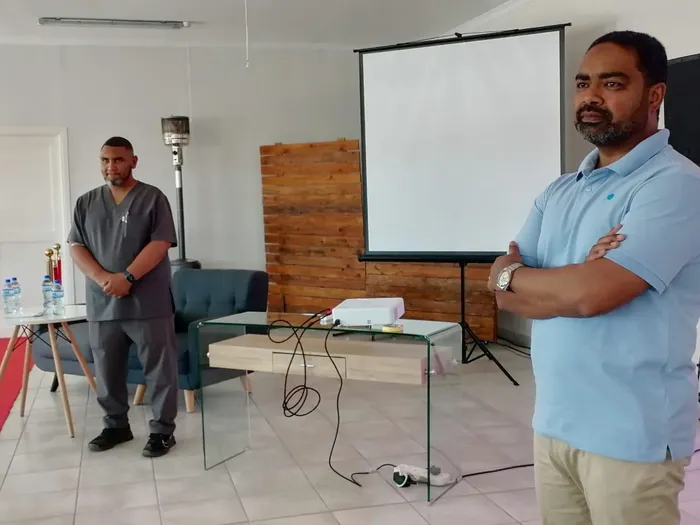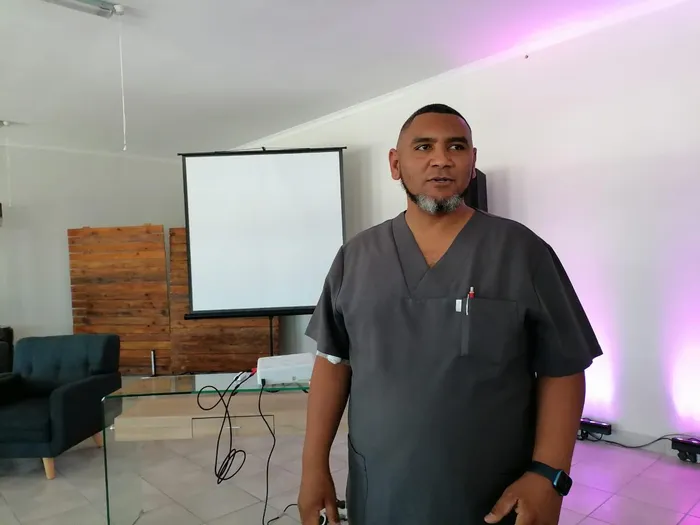Open conversations on men's mental health
An outreach session focused on men’s health and mental well-being was held at Watergate Village on Saturday, November 22, where participants engaged in open discussions about the challenges they face.
Dr Randall Ortel, who facilitated the session, said he was struck by the depth of the discussions. “We simply provided the space; the men brought the conversation,” he said.
“It highlighted a real need for social spaces where men feel comfortable talking about their health.”
He explained that they do not yet have a long-term blueprint for the initiative, but the first objective-bringing men into the space and allowing them to ask questions-had been achieved. Many men asked how they could become better versions of themselves regarding mental health, and how to have meaningful family discussions.
A significant concern raised was the amount of health information men encounter on social media, much of it from other countries.
“This raises the question, are we, as South Africans in the health space, doing enough to put our own content, context, and knowledge out there?” Dr Ortel said.
When patients search online, they are often flooded with information from abroad, and the interventions they see may not be available locally.
“Then they lose hope in our health system, believing we cannot provide what they need. But we might have our own modalities, based on our culture, that could have even better outcomes,” he said.

Professor Tasleem Ras, of University of Cape Town (UCT) and Dr Randall Ortel led the conversion about men's mental health
Image: Siyavuya Khaya
He said he valued the session.
“One of the most profound statements I heard today was that many men feel their mental health and becoming better human beings is far more important than the prostate. Men genuinely want to be better. And what we emphasised today is that you cannot separate the brain from the body-if the body isn’t well, the brain is affected.”
Dr Ortel said that the next step is helping men understand where they are mentally.
“There is going to be a huge focus on mental health. Our health system is a multidisciplinary team. I’m seriously inspired by these men, and I don’t have all the answers. What I walk away with is that the demand is far greater than what I can offer alone. I need to sit down, strategise, and get a team together. This is not about Dr Randall Ortel. I may be the catalyst, but we need collaboration because this is public health. I don’t regret doing this session. Mental health is a huge issue, and we need to instil this in our cultures. We need to speak up and seek help,” he said.
Professor Tasleem Ras of the University of Cape Town (UCT), one of the key speakers, said he is passionate about community empowerment.
“If people can make proper decisions about their health, that improves their quality of life,” he said. He said the importance of making wise and informed health decisions.

Dr Randall Ortel said he was happy that a lot of men came and shared their challenges and hopes.
Image: Siyavuya Khaya
Mr Ras described the initiative as “fantastic,” highlighting the need for men to have a space where they can have honest, open conversations with peers who share similar experiences.
His message focused strongly on men’s mental health and the need for honesty, both with themselves and those around them. He addressed the common struggle of what it means to be a man and to face men’s mental issues.
Asked why men often do not open up, he said: “Men are told to be strong, and that dealing with emotions is a sign of weakness. The message I want to put across is that dealing with emotions is actually a sign of strength. People who don’t deal with their emotions become toxic internally, and that toxicity affects their relationships and their ability to have a good quality of life. We need to be honest with ourselves, acknowledge when we are struggling, and reach out for help before things start to fall apart.”
He added that men who did not attend the event missed an opportunity to gain insight into the challenges they face.
“Women often feel more comfortable speaking about their mental health. This health-focused men’s club gives men a chance to put their own health at the forefront," he said.
One of the attendees, David Gous, CEO of BIZ-Connexity, said it was a great initiative because many men hold things inside, sometimes carrying childhood trauma that causes ongoing stress. “Men often suffer in silence,” he said.
“We were raised hearing that men don’t cry and must always show strength-but that mindset has to shift. Men have emotions and feelings just like everyone else.”
He added that many men only open up when they are drinking, which needs to change.
“We need to have sober conversations, and this club is precisely for that. Men miss the sense of brotherhood where they can share their challenges and discover that others are experiencing the same or similar issues.”